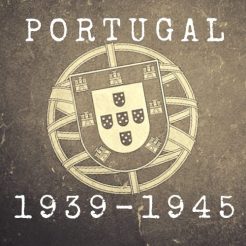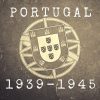Alpha
Captain: José Ferreira de Oliveira
Type: Cargo Steamer
Tonnage:
Owner: Sociedade Luso-Marítima
Homeport: Lisbon
Construção/Built:
Acontecimento/Event: Sunk in the English Channel by German Planes

Alpha
(Picture: Blog "Navios e Navegadores")
The German planes approached from the Southeast dropping bombs and firing machine-gun bursts. Because of the intensity of the attack, the order to abandon the vessel was given immediately, “which was achieved without any crew member being injured, despite the ship being hit by bullets and bombs”, reported captain José Ferreira de Oliveira, later.
The attack started at around 1 pm and, as the 21 men rowed away, the freighter continued under fire by the Luftwaffe for more two hours. Although hit several times and half demolished, it only disappeared in the North Sea at 6 pm.
It was the 15th of July 1940 and the ALPHA was the first Portuguese ship to be sunk during World War II. The crew saw the ship disappear in the lifeboat, knowing that they were far from reaching land.
The steamer from the Sociedade Luso-Marítima had left Lisbon loading bananas on July 10, the day on which Oliveira received “at the British Consulate, the secret instructions for the journey” to Liverpool, in the United Kingdom .
World War II had started less than a year ago, but the strategic situation had changed with France's surrender. On the day the ALPHA began its journey, the Germans started Operation “Seelove” (Sea Lion), whose ultimate objective was the invasion of the United Kingdom.
The first phase of the plan was aimed to hit the British merchant and war fleets, and disabling port facilities through attacks with surface ships, submarines and planes. It was the beginning of the Battle of England that only weeks later would register the intense combats on the British skies that are still remembered today.
When Commander Oliveira received the secret orders from London to approach Liverpool, the British were no longer able secure the routed on the North Sea or the English Channel. With bases in France hundreds of German planes and speedboats patrolled the skies and seas, attacking all the targets they could find.
In fact on the 15th the Germans made fewer flights than in the previous days, but on the ALPHA the concern was growing since the first lights of the morning due to the intense movement of planes and the fact that some circled right above the freighter. Fearing to be confused for a belligerent ship, Ferreira de Oliveira ordered the replacement of the ships flag with a larger one, bought just before leaving Lisbon.
The ship also complied with all the rules imposed by the belligerent countries so it could easily be identified as neutral. In addition to the cloth flag, it also had the national colors painted on both sides of the hull, where the country's name could also be read in large letters.
Although the ship attracted the attention of the planes more than once, none of them showed any aggressive attitude or intention to establish contact. Only after one o'clock in the afternoon, and without warning, the attack occurred with eight planes unloading all their power on the freighter.
After leaving the ship, the crew headed south, towards France occupied a few weeks ago by the Germans, the same that had attacked them. Two days later they were still at sea when they were spotted by the “REINE DES FLEURS”, a French fishing sloop that towed them to Audierne where they docked in mid-morning.
This arrival did not mean the end of the uncertainties for the Portuguese crew. The French handed them over to the German military authorities, who had no hurry in interrogating them. When they asked to contact a Portuguese consul, the Germans ensured that the next day they would be taken to Brest, where a Portuguese consulate was. The promise was never fulfilled.
In the next days, accompanied by two German army sergeants, they carried out a train tour passing several French cities. They got through Quimper, Nantes, Bordeaux and finally Hendaia, where they arrived on the 21st, traveling in conditions the Portuguese captain considered unworthy. The Germans never made "a distinction between officers and crew, (…) always transporting everyone together in third class, eating only one meal a day and sleeping on pallets on the ground”, reported Oliveira. In the last French city they slept “in a train carriage, just thanks to the stationmaster”.
In Hendaia, they went to the local command of the German Army hoping to get transport trough Spain, but they managed nothing, and the same happened at the Spanish consulate, where they went next.
They barely managed to get train tickets but finally, on the 22nd, they were able to cross the border arriving in Irún where they found the protection of the local Portuguese consul who sent them to San Sebastian.
They were able to arrive in Lisbon on the 25th at 8 am…
Carlos Guerreiro
Nota: Meet the Alpha Crew
Sources:
- Archives: Arquivo Histórico da Marinha (PT).
- Books and other publications: Diário de Lisboa (1939-1945)

